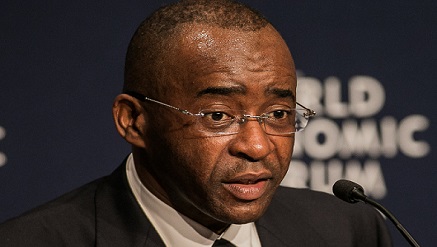This is contained in a statement signed by Dr Ejike Ndiulo, head of Corporate Communications, Air Peace, on Wednesday in Lagos.
According to Ndiulo, the decision is necessary because NiMet is the agency responsible for issuing CNH (Current Nowcast of Hazardous Weather) reports, critical for safe landings, especially during this season of heavy rainfall and thunderstorms.
He said without these reports from the control tower, flight safety could not be guaranteed.
“As a safety-first airline, we have chosen to act responsibly by suspending operations until NiMet resumes full service.
“We understand this may cause inconvenience, and we sincerely apologise. Passengers will be contacted with updates and options for rescheduling,” he said.
The staff of NiMET on Tuesday commenced an indefinite strike over the condition of service and other demands.
News
Unlocking Potential of Africa’s Socio-Economic Prosperity

Mr. Strive Masiyiwa, Africa against Ebola Solidarity Trust Board member and chairman of Econet, has said that for Africa to achieve its vision of social and economic prosperity, African governments and business must join forces and commit human and financial resources for the potential eradication of developmental threats such as the prevailing Ebola pandemic in West Africa.
“The development of Africa’s solid socio-economic stature undoubtedly depends on a properly articulated vision as well as a strategic practical plan. However, vision and planning alone are not sufficient. As a result, it is imperative that policy makers in Africa begin to assess and select the correct delivery models, founded on innovative economic support that is complimented by the private sector. We need to think carefully about how we restore the dignity of the people of Liberia, Guinea and Sierra Leone and how we stabilise their economies. The public-private partnerships approach is necessary if Africa is to improve its deeply rooted socio-economic and societal problems as well as eradicate the obstructions preventing the continent from attaining its developmental projects goals,” explained Mr. Masiyiwa.
He added that an effective response must focus on unique alliances and public-private partnerships structured to mitigate the multi-faceted impact of societal challenges. Failure to cooperatively pursue these goals using new and innovative approaches can only contribute to new and re-emerging development obstructions for the Africa continent.
“In West Africa, specifically in the regions that have been severely hit by Ebola, there has been a delay in relation to Africa-led innovative efforts aimed at mobilising resources that could potentially strengthen the socio economic status of the continent. Because of this, preparedness and response planning, with respect to emerging health threats, aimed at improving the health security and safety of the African community, is an important aspect of the continental development strategy,” Mr. Masiyiwa concluded.
News
Air Peace Suspends Flight Operations Nationwide

News
NITDA Fixes Date for Inaugural Meeting of the Startup Consultative Forum

The National Information Technology Development Agency (NITDA) is pleased to announce the inaugural meeting of the Startup Consultative Forum, scheduled for Monday April 28, 2025 This milestone event marks a significant step in deepening stakeholder engagement within Nigeria’s growing startup ecosystem.

The Forum will serve as an interactive platform for startup founders, innovators, ecosystem enablers, and intermediaries to actively shape national policies that foster growth, attract investment, and drive digital innovation.
Convened under the framework of the Nigeria Startup Act (NSA), this initiative reflects the government’s commitment to making startups not just stakeholders but key contributors in building an enabling environment for innovation.
The meeting will emphasize collaborative dialogue, with a primary focus on nominating and selecting representatives for the National Council for Digital Innovation and Entrepreneurship (Startup Council)—Nigeria’s highest advisory body for the startup ecosystem. Decisions from this Forum will lay the foundation for inclusive policy development, amplifying the voices of Nigeria’s tech and innovation community.
NITDA invites all Labelled Startups, Verified Entrepreneurial and Innovation Support Organisations, Angel Investors, Venture Capitalists, and other relevant stakeholders to join the Forum and actively participate in the nomination and voting process.
Join us in shaping the future of digital innovation in Nigeria. Together, we can build a thriving ecosystem that supports and celebrates the pioneering spirit of Nigerian startups.
News
IMF Downgrades Nigeria’s Economic Growth Forecast Amid Oil Price Decline

International Monetary Fund (IMF) has revised downward its economic growth forecast for Nigeria in 2025 to 3.0%, a 0.2 percentage point cut from its earlier projection of 3.2%.

The downgrade is attributed to a decline in global crude oil prices, which remain a significant driver of Nigeria’s economy.
The updated figures were published in the IMF’s April 2025 World Economic Outlook (WEO) report, released in Washington, DC, during the ongoing Spring Meetings of the IMF and the World Bank.
The report outlines global and regional economic trends, highlighting continued vulnerability among oil-dependent economies.
According to the IMF, growth across sub-Saharan Africa is also expected to experience a modest decline, with projections falling from 4.0% in 2024 to 3.8% in 2025. However, a slight recovery is anticipated in 2026, with growth forecasted at 4.2%.
Nigeria, Africa’s largest economy, was singled out in the report as among the major economies affected by falling oil prices. The IMF noted that the country’s 2026 growth forecast has also been revised downward by 0.3 percentage points.
The IMF further reported similar economic challenges in other African countries. In South Africa, growth projections were adjusted downward by 0.5 percentage point for 2025 and 0.3 percentage point for 2026.
These revisions reflect weakening economic momentum following a lacklustre 2024, growing uncertainty, a rise in protectionist economic policies, and the impact of a broader global slowdown.
In a more severe adjustment, the IMF slashed South Sudan’s 2025 economic growth forecast by a staggering 31.5 percentage points.
The sharp decline is linked to delays in the resumption of oil production after a major pipeline sustained damage, significantly impacting the country’s revenue and export capacity.
The IMF’s outlook underscores the fragility of economies heavily reliant on natural resources and the ongoing risks posed by global market volatility.

 Telecom3 days ago
Telecom3 days agoDigital Transformation Remains Africa’s Gateway to Economic Advancement – Adumike

 Telecom3 days ago
Telecom3 days agoPAFON 2.0: Experts Discuss Pathways to Boost Financial Inclusion in Nigeria

 General News3 days ago
General News3 days agoEFCC Clarifies SCUML Certificate Misuse amid CBEX Ponzi Scheme Scandal

 Telecom2 days ago
Telecom2 days agoMTN Nigeria Faces Class Action Lawsuit over Alleged Data Mismanagement

 General News2 days ago
General News2 days agoFG to Introduce New Tax Credit Scheme to Replace Pioneer Status Incentive

 E-Financial2 days ago
E-Financial2 days agoFCMB Capital Markets Leads ₦11.85bn GLNG Bond for LNG Plant Expansion

 E-Financial3 days ago
E-Financial3 days agoCBN, NGX Group Defend Economic Reforms at Nasdaq

 Telecom2 days ago
Telecom2 days agoNigeria Hits 1 Terabit Internet Traffic Milestone




























